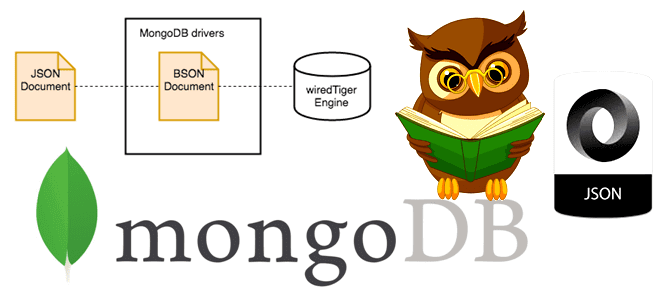MongoDB is a powerful and flexible NoSQL database that has become a popular choice among developers due to its performance, scalability and ease of use. Unlike traditional relational databases, MongoDB is based on a document-oriented data model, which allows you to store information in a JSON-like format.
One of the main advantages of MongoDB is horizontal scaling, which makes it easy to expand the data warehouse by adding new servers. This makes MongoDB an ideal choice for projects requiring high availability and scalability.
In addition, MongoDB has a rich set of features, including index support, aggregation queries, text search, geospatial queries, and more. Combined with flexible data modeling capabilities, MongoDB offers developers a powerful tool to work efficiently with various types of data.
Advantages of MongoDB over other DBMS
1. Flexible data schema. MongoDB provides the ability to work with unstructured data, making it an ideal choice for projects with uncertain or changing requirements.
2. Horizontal scaling. MongoDB has the ability to scale horizontally, which makes it easy to increase productivity and store huge amounts of data.
3. High performance. MongoDB processes queries efficiently through the use of indexes and optimized algorithms.
4. Open source code. MongoDB is distributed under the AGPL license, which allows you to use it for free and adapt it to your needs.
Flexible data structure
MongoDB has a flexible data structure that allows you to store heterogeneous sets of information. Thanks to the document-oriented data model, each record is a JSON-like document containing any number of fields. This makes it easy to add, delete, or modify the data structure without having to update the entire database. This approach is especially useful when developing dynamic applications where data structure requirements may change.
High query performance
In addition, MongoDB offers the ability to scale horizontally, which means that the database can be expanded to multiple servers. Due to this, the system is able to process huge amounts of data and queries, which makes it an ideal choice for high-load projects.
Thanks to a common database structure and a specially designed query language, MongoDB provides efficient execution of complex queries, which makes it an excellent tool for applications where speed and performance are important.
Horizontal scaling
Horizontal scaling in MongoDB is achieved through the use of sharding, which allows you to distribute data across different servers (shards) based on keys. This allows you to distribute the load evenly and ensure high data availability.
This approach makes it easy to scale the database as your application grows, without being limited by the resources of a single server.
Fault tolerance and data replication
MongoDB provides fault tolerance and data replication, making it an ideal choice for applications requiring reliability and stability.
The MongoDB replication system allows you to create copies of data on multiple nodes, which provides increased protection against information loss in the event of failures or failures. When one of the nodes becomes unavailable, the other nodes automatically take over the load, ensuring smooth operation of the system.
In addition, thanks to the sharding mechanism, MongoDB is able to scale horizontally, allowing it to process large amounts of data and high loads without loss of performance.
Effective work with large amounts of information
The main mechanism that ensures efficient processing of large amounts of information is sharding. MongoDB allows you to distribute data across multiple servers (shards), which allows you to evenly distribute the load and ensure high availability.
The advantages of working effectively with big data in MongoDB:
Horizontal scaling for processing huge amounts of data
Sharding for even load distribution
High performance and query processing speed
The variety of MongoDB tools and features
Developer Tools
MongoDB has a variety of developer tools, such as a powerful command interface (CLI), database management, monitoring, and analytics tools. These tools greatly simplify working with data and provide more efficient database management.
Advanced features
In addition to standard data storage and query functions, MongoDB also offers advanced features such as replication, sharding, text search, data aggregation, full-text search, and others. These capabilities make MongoDB a powerful tool for developing modern applications.
Advanced Features of MongoDB Developer Tools
CLI Replication
Sharding Management Tools
Text search Monitoring and Analytics
Q&A:
How does MongoDB differ from relational databases?
MongoDB differs from relational databases in that it does not require a strict data schema, supports horizontal scaling, the use of a JSON-like format for storing data, and also has rich functionality for working with large amounts of data.
What advantages does MongoDB have over other NoSQL databases?
The advantages of MongoDB include high performance, flexible data schema, automatic sharding for scaling, a convenient document-oriented approach to data storage, and the ability to use indexes to optimize queries.
Why is MongoDB considered a reliable storage solution?
MongoDB is considered a reliable solution due to its built-in data replication, automatic recovery, data integrity mechanisms, fault tolerance, and good support from the community and development team.
What real-world examples of MongoDB applications exist?
Examples of MongoDB applications include storing large amounts of data in online stores, analytical storage for Big Data, content management systems, IoT projects, mobile applications and other tasks requiring scalable data storage.
What features of MongoDB queries should you know when working with this solution?
Features of queries in MongoDB include the use of an aggregation framework for data analytics, support for indexes to optimize queries, the ability to use various operators to filter data, as well as transaction support in recent versions.


